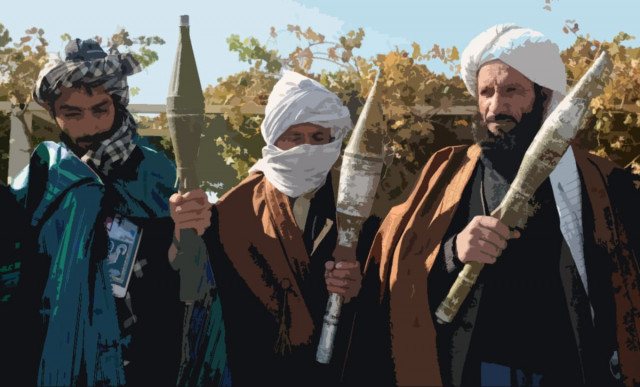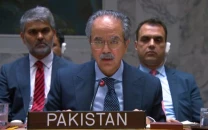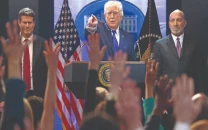Taliban in Qatar see no early peace talks with US: Sources
Many of the Taliban leaders living in Qatar now appear to spend their time pursuing private family activities.

Many of the Taliban leaders living in Qatar now appear to spend their time pursuing private family activities. PHOTO: AFP
A team of envoys from the insurgent group flew to Qatar in early 2012 to open talks with the US government, which has laid a greater emphasis on negotiations before a handover of security to Afghan forces in 2014.
Among the most prominent members of the delegation in Doha is Tayeb Agha, the former chief of staff to the Taliban's reclusive leader, Mullah Mohammed Omar.
But more than a year later, the negotiations held in March 2012 have not been followed by further meetings, Taliban sources familiar with the matter told Reuters.
Many of the Taliban leaders living in Qatar now appear to spend their time pursuing private family activities.
Many can be seen at the shopping malls of the gas-rich Gulf Arab state, pushing trolleys loaded with merchandise and with their children in tow.
"There has been no contact from the US with us at all this year," said a Taliban source under condition of anonymity.
No date had been set to restart the talks, he said, declining to give any further details.
Talks among the United States, Pakistan and the Taliban about a possible Afghan settlement have made scant progress in the past few years.
The Taliban suspended the talks in March 2012, saying Washington was giving mixed signals on the nascent Afghan reconciliation process.
Resilient
"Taliban had asked for the exchange of prisoners and recognition as a group, but as far as I know there have been no more talks," said Mohammed Himat, counselor at the Afghan embassy in Doha, told Reuters.
The talks in Doha between the Taliban and the United States in 2012 had taken place at a US military facility, he said.
Afghan officials have not held formal talks with the militants, who were toppled by US-led forces in 2001 in the wake of the September 11 attacks on the United States but have proven resilient after more than a decade of war.
The Kabul government has said it wants to start talks with the Taliban to end the conflict before the planned departure of most foreign combat troops by the end of 2014.
Last month, Afghan President Hamid Karzai flew to Doha and held talks with the emir, Sheikh Hamad bin Khalifa al-Thani, in an effort to speed up the opening of a Taliban representative office in Qatar where further talks could be held.
Karzai had initially resisted Western plans to grant the Taliban an office in Qatar, concerned that it would give the movement political legitimacy and reduce his control over the direction of any future talks. But he endorsed the proposal in late 2011 under pressure from his allies.
Other countries who had also offered to host the office were Turkey and Saudi Arabia, Himat added.
However, an Afghan government official familiar with the peace talks said Saudi Arabia was not an ideal option as it was seen as having strong ties with Pakistan.
Afghan officials have long accused Pakistan of backing the Taliban or tolerating the movement's leaders presence on its territory in the hope of using the force as proxy to influence events in Afghanistan.
Nasrullah Stanekzai, an advisor to Karzai in legal affairs, told Reuters the opening of a Doha office for the Taliban would help Afghanistan engage in direct peace talks with insurgents and limit Pakistan's influence on the process.



















COMMENTS
Comments are moderated and generally will be posted if they are on-topic and not abusive.
For more information, please see our Comments FAQ